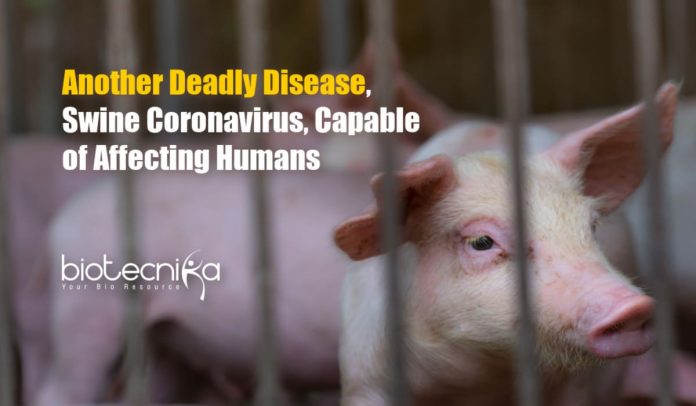Swine Coronavirus Could Infect Humans: New Study Finds
A new study claims that it is possible for swine acute diarrhea syndrome coronavirus to spread to humans from pigs.
Globally, there are various different strains of coronavirus, and not every strain is capable of infecting humans, so far, seven types of alpha and beta coronavirus strain capable of infecting humans including SARS-CoV-2, SARS-CoV, and MERS-CoV viruses are listed by the US Centers for Disease Control and Prevention (CDC). Likewise, there are different types of coronavirus that do not infect humans and infect only animals.
Recently, the swine industry has been greatly concerned about a specific coronavirus strain among these that infects swine or pigs, as this strain could also be transmissible to humans, according to a new study reported in the Proceedings of the National Academy of Sciences (PNAS).
According to a study published in Virus Research, there have been five different coronavirus species that infect pigs to date, and this strain of coronavirus, SADS-CoV, known as swine acute diarrhea syndrome coronavirus, also known as porcine enteric alphacoronavirus (PEAV) and swine enteric alphacoronavirus (SeACoV) was, discovered in 2017, in China’s Guangdong province at majorly four swineherds, where the outbreaks of severe
diarrhea in suckling piglets occurred.According to the study, SADS-CoV is capable of infecting pigs orally and was indicated to be originated in bats as it was closely related to the species Rhinolophus bat coronavirus HKU2. However, because of the absence of current evidence, the definite pathogenicity of SADS-CoV was debatable. The new PNAS study could be providing a definite answer.
Evaluating the human vulnerability for SADS-CoV cross-species transmission and replication was the aim of the PNAS study. To check if virus replication, transmission, and in vitro gene expression was possible, the scientists infected human sample cells with a synthetic clone of the SADS-CoV virus they developed.
It was observed that in primary human cells obtained from intestines and lungs, the SADS-CoV replicated efficiently, indicating the virus’s inherent potential for cross-species transmission, particularly to humans from pigs. The study deduced that mechanisms to stop this replication and transmission need to be developed immediately given the risk of pathogenicity in humans due to SADS-CoV.
Further, they found that the transmission and pathogenesis of SADS-CoV in humans could be potentially blocked by the key broad-spectrum antiviral, the drug remdesivir, by evaluating the capability of small-cell inhibitors to hinder the spread of SADS-CoV in human cells. They indicated that in case there is a spillover outbreak from pigs to humans, remdesivir can serve as a treatment option though there are more clinical trials required to confirm its effectiveness.
Additionally, they mentioned that swine industry workers’ health must be supervised more as in event of an outbreak, they could be able to transmit the infection as they would be potential carriers.






























